Adults in Israel are closely divided on whether they trust the national government to do what is right for the country, and just 35% are optimistic about the future of Israel’s political system. Institutions such as the military, police and Supreme Court are generally seen as having a positive influence on society, though these views vary significantly along ethnic and ideological lines.
At the time of the survey, taken before Gantz left the government and Netanyahu disbanded the war cabinet, most Israelis expressed negative attitudes toward their political leaders. Just one of the seven officials we asked about – Defense Minister Yoav Gallant – got favorable ratings from a clear majority of Israelis.
Trust in the government
Israelis are quite divided over whether they trust the national government to do what is right for Israel, with 53% saying they trust it and 47% saying they do not. Israeli Jews are about three times as likely as Israeli Arabs to say they trust the national government (61% vs. 23%). Indeed, nearly four-in-ten Israeli Arabs (37%) say they do not trust it at all.
At present, Israelis on the ideological right are much more inclined to trust the national government (75%) than are those in the center (40%) or on the left (19%).
Among Jews, 88% of Haredim (“ultra-Orthodox” Jews) and Datiim (“religious” Jews) say they trust the national government to do what is right for Israel – more than double the 39% of Hilonim (“secular” Jews) who feel this way.
Israelis with a favorable view of Prime Minister Benjamin Netanyahu are also much more likely than those with an unfavorable view of him to express trust in the government (95% vs. 22%).
Similarly, supporters of parties in Netanyahu’s coalition are much more confident in the national government than those who do not support the coalition (91% vs. 29%).
While the overall percentage of Israelis who express at least some trust in the government is unchanged since the question was last asked in 2017, both the share who trust the government a lot and the share who do not trust it at all have increased.
This polarization has occurred largely along ethnic lines: The share of Israeli Jews who say “A lot” has doubled (from 16% in 2017 to 32% in 2024), while the share of Israeli Arabs who say “Not at all” has more than doubled (from 15% to 37%).
Influence of various groups and organizations in Israeli society
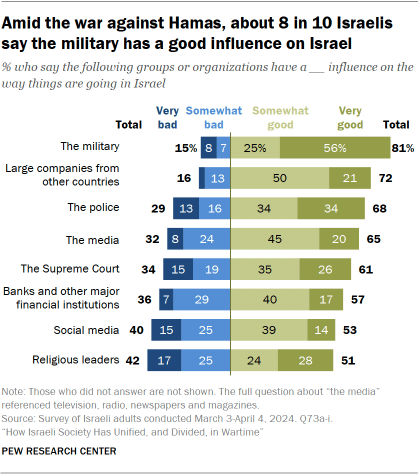
As the Israel-Hamas war continues, most Israelis (81%) say the military has a very or somewhat good influence on the way things are going in Israel. This is greater than the share who say the same about any other institution or group asked about in the survey. Religious leaders got the lowest rating (51% say they have a good influence).
By roughly two-to-one, more Israelis say the Supreme Court has a good influence than a bad influence on the way things are going in Israel. This follows major protests in 2023 in response to Netanyahu’s plan to reform the judiciary.
Other actors in Israeli life – such as large foreign companies, the police, the media, social media, and banks and other major financial institutions – are generally seen to have a positive influence as well.
However, views of many of these institutions and groups tend to differ depending on the respondent’s ethnicity, political ideology and level of religious observance.
Views by ethnicity
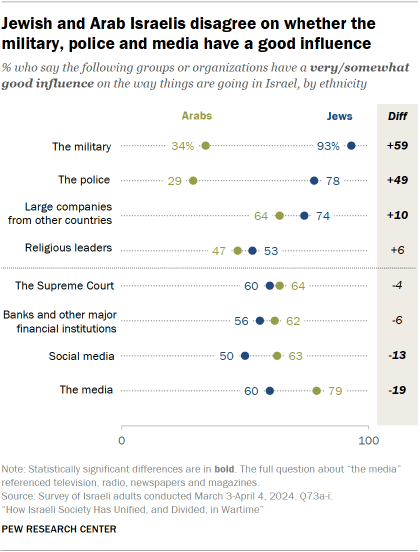
Jewish Israelis are more likely than Arab Israelis to say the military, foreign companies and the police have a very or somewhat good influence on the way things are going in Israel. The 59-point difference in views of the military is especially striking: 93% of Jews say the Israeli military has a good influence, while just 34% of Arabs agree.
This gap has grown since we last asked the question in 2007. Then, 77% of Jews and 57% of Arabs said the military had a good influence. In other words, there has been a 23-point decrease among Arabs and a 16-point increase among Jews in positive views of the military since 2007.
Arabs are more likely than Jews to say the media has a positive influence on Israeli life (79% vs. 60%). (The survey was conducted prior to Israel shutting down Al Jazeera’s operations in the country.) And Arabs are more likely than Jews to say social media has a positive influence (63% vs. 50%).
Jews and Arabs do not differ significantly in their evaluations of the influence that religious leaders, the Supreme Court, and banks and other major financial institutions have on the way things are going in Israel.
Views by ideology
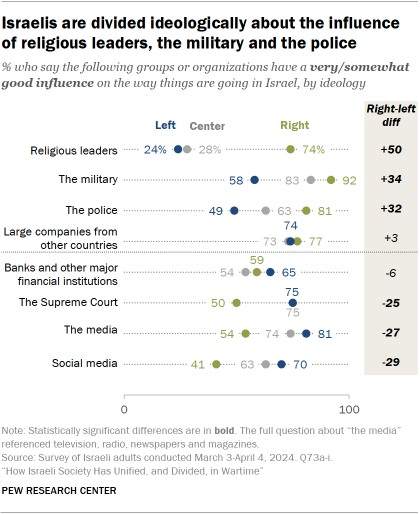
There are large differences across the ideological spectrum on the influence of various institutions and groups in Israel.
The gap between adults on the ideological right and left is particularly large when it comes to attitudes toward religious leaders. Roughly three-quarters of those on the right say religious leaders have a positive influence on the way things are going in Israel, compared with about a quarter each among those in the center and on the left.
We also see gaps greater than 30 points between the shares of Israelis on the right and left who say the military and the police have a positive influence.
The direction of the gap is reversed regarding the positive influence of social media (-29 points on the right), the media (-27) and the Supreme Court (-25).
Attitudes about the Supreme Court’s influence stand out: Israelis on the left and in the center are equally likely to say it’s positive (75% each), compared with 50% of those on the right.
Views by Jewish religious observance
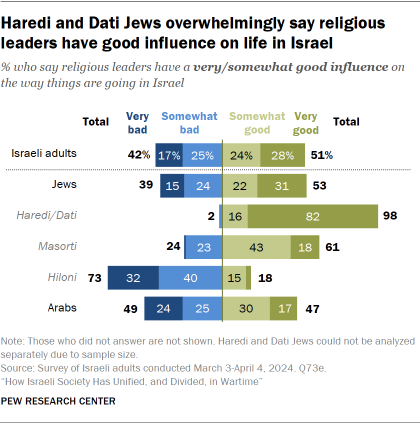
Among Jews, those who self-identify with the highly religious categories – Haredim and Datiim – overwhelmingly say religious leaders have a positive influence on how things are going in Israel. Overall, 98% of Haredi/Dati Jews say this, with 82% saying religious leaders have a very positive influence. Most Masortim, or “traditional” Jews, agree (61%). Among Hilonim, or “secular” Jews, just 18% say religious leaders have a positive influence on life in Israel.
The pattern is the opposite when it comes to the influence of social media and the Supreme Court. Just over half or more of Hiloni (64%) and Masorti (54%) Jews say social media has a positive influence, compared with 26% of Haredi/Dati Jews. Similarly, roughly three-quarters of Hilonim (76%) say the Supreme Court has a positive influence, compared with about half or fewer among Masortim (49%) and Haredim/Datiim (45%).
Views of Israeli political leadership
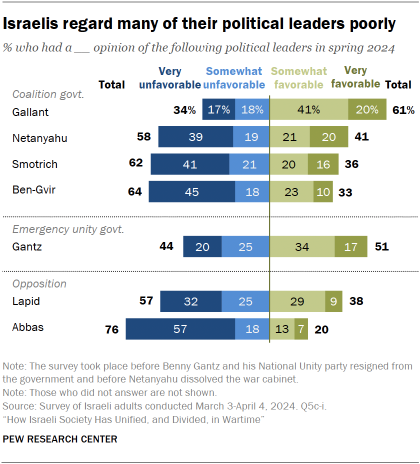
Israelis had generally dim views of most political leaders we asked about in our March 3-April 4 survey (which preceded the dissolution of Israel’s war cabinet).
Some members of the war cabinet were seen favorably by about half of the public or more. But Netanyahu, members of his governing coalition and those in the opposition were much less popular.
Among the political leaders asked about, Minister of Defense Yoav Gallant was the most popular: 61% had a very or somewhat favorable view of him. About half felt similarly about former war cabinet member Benny Gantz, who left the opposition to help form the emergency unity government shortly after the war with Hamas began. (The survey also took place before Gantz resigned from the government.)
Netanyahu, the chair of the former war cabinet, was the least popular of its members. Approximately four-in-ten Israelis had a favorable view of him (41%), while a 58% majority had an unfavorable view of the longtime prime minister.
Other members of Netanyahu’s right-wing coalition received even less support. A third of the Israeli public had a favorable view of Minister of National Security Itamar Ben-Gvir. A similar share (36%) favored Minister of Finance Bezalel Smotrich. Larger shares saw them in a negative light – in fact, 45% and 41% of Israelis expressed very unfavorable views of Ben-Gvir and Smotrich, respectively. (The survey was conducted before the two leaders threatened to collapse the government if Netanyahu accepted U.S. President Joe Biden’s cease-fire proposal.)
The Israeli opposition was also unpopular with the public. Its leader, Yair Lapid, was favored by 38% of Israelis. Most (57%) had an unfavorable view of him.
Mansour Abbas, leader of the United Arab List (a conservative party better known in Israel as Ra’am), was seen favorably by 20% of Israelis. About three-quarters of the public (76%) thought unfavorably of him.
Views of Israeli politicians differed by ethnicity, Jewish religious observance and political ideology.
Views by ethnicity
The biggest differences between Arab and Jewish Israelis on this question were in opinions of Gallant and Abbas. More than seven-in-ten Jews rated Gallant favorably, while only 9% of Arabs did the same. In the case of Abbas, 64% of Arab Israelis favored him, compared with only 8% of Jewish Israelis.
Views were closest on Lapid, leader of centrist party Yesh Atid. He was seen favorably by 41% of Arabs and 37% of Jews.
Generally speaking, politicians belonging to the Israeli right – Ben-Gvir, Gallant, Netanyahu and Smotrich – received very little support from Israeli Arabs.
Views by Jewish religious observance
Majorities of Haredi and Dati Jews had favorable views of Ben-Gvir (77%) and Smotrich (78%). Netanyahu was seen favorably by an even larger share of Haredim and Datiim (88%).
Secular Jews expressed generally low favorability of these leaders. Among Hilonim, about one-in-five or fewer had a positive opinion of Netanyahu (21%), Abbas (17%) or Smotrich (17%). Only 13% saw Ben-Gvir in a positive light.
Hilonim had more favorable views than Haredim/Datiim when it came to Gantz (76% vs. 32%) and Lapid (61% vs. 11%).
Views by ideology
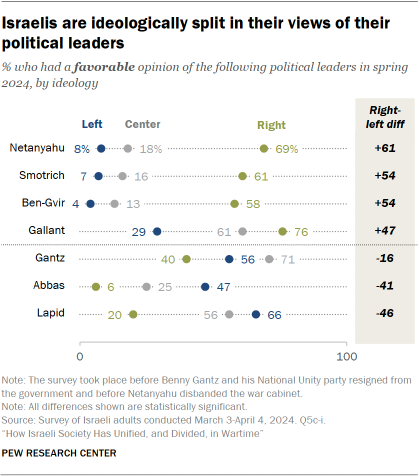
Gallant was rated favorably by three-quarters of Israelis on the ideological right, making him the most popular politician among right-leaners at the time of the survey. Smaller majorities of right-leaning Israelis had favorable views of Netanyahu (69%), Smotrich (61%) and Ben-Gvir (58%).
Among Israelis on the ideological left, fewer than 10% gave favorable ratings to Ben-Gvir, Netanyahu and Smotrich. Of the seven leaders asked about, left-leaners viewed Lapid most favorably (66%).
Israelis in the center thought most favorably of Gantz (71%) and Gallant (61%), and over half of them favored Lapid (56%). Ben-Gvir, Netanyahu and Smotrich were each seen favorably by a fifth of Israelis in the center or fewer.
(Read about Israeli views of Palestinian leaders in our previous report.)




